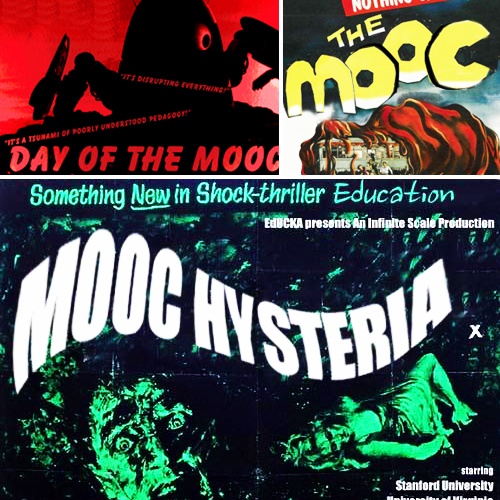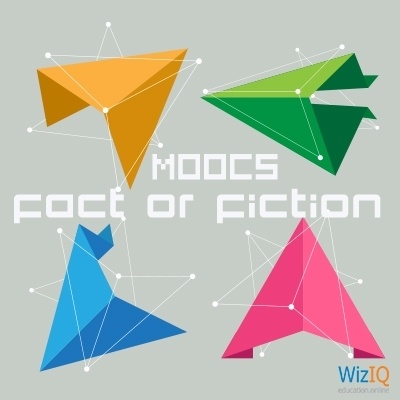The Year of Mocking the MOOCs
In the year 2012, also dubbed as "the year of the MOOC" by NY times, I remember Googling MOOCs and finding these scary, hollywood style, posters of people screaming “The MOOCs are coming”, and in the background lurking was a huge dinosaur-ish figurine of (supposedly) a MOOC.

As we are headed towards the close of 2013, it seems the world of education and technology has either befriended or tamed the past year’s monster. Although incessantly assessed for a few years now, MOOCs have taken criticism pretty well since there is no stopping the spread. My Google alerts haven’t abated and a ridiculously high number of students from the world over still continue to contribute to important analytical data and numerics for research and studies on MOOCs.
Is MOOC a cyborg?
Even now, MOOCs as a concept seems obtruse perhaps due to a want of enough data. The emergence of various theories both in favor and defiance of MOOCs hang in a balance with an abstinence from shifting towards an absolute definition. If I am to accoutre the world with a theory of my own, I would say MOOCs are like Cyborgs. There is a certain amount of human-ness to it. however, it is not entirely human. There is an apparent coldness and detachment that can be felt even through the screen of the MOOC-taker’s laptop.
End of Reality
A possibly bright outcome of MOOC-ifying every last course on this planet could be actuating the human race to evolve as autodidacts or self-learners. It would become a necessary mutation for surviving in the age of the MOOCs. However, viewing past the silver lining, it would also be the end of reality as we know it. The abominable world of virtual reality is not far now. Minimising human interactions for scaling the reach of education is already one of the major founding aspects of MOOCs. So perhaps we don’t really need human aid in the process of learning. If connectivism is to be adhered, the connections that we make online assist in learning. Same is true if you are a believer of Sugata Mitra’s concept of Minimally Invasive Education (MIE). So while it is the end of reality, is it also the end of ‘the profession of teaching’? A recorded video or voice for a course is hardly enough to convince me I am being taught by a teacher. We already have those kind of resources and they are called ‘YouTube’ and ‘Khan Videos’.
Do we really want to learn more or are we just lazy?
As much as I would like to champion the thought of sticking to claustrophobic classrooms and chalky blackboards, abuzz with the chatter of around 50 excited minds with the dull, droning voice of a teacher in the background, I have a confession to make. When I go through a list of MOOCs being offered all around the world, it is with much difficulty that I stop myself from enrolling into all of them. Free of cost, self-paced, stress-free online versions of the most decorated courses offered by some of the most celebrated universities; it is hardly a thing to pass by. And this is when I can connect with all the others falling for the same vogue. But will I take them all? Will I sit through every video and read through every resource? Will I be able to stuff my calendar with work, home, regular college and online college? Although not entirely impossible to juggle around, I somehow think confusion would take over sooner than lethargy or even tiredness.Although I believe the initial MOOCs were fashioned for a revolution and definitely not for the fancies of a lazy learner, I somehow foresee a dampening of the spirits with time.There are questions as to why is it easy to view individual videos and read random blog posts all day long, but when it comes to ‘completing’ a MOOC, motivation levels betray even the most inspired of learners. Moreover, as of now, there is no mandate on taking a MOOC and almost all learners invite themselves.I would blame this dragging-through to the pedagogy; same old course served in a seemingly different palate. Here I would agree with Stephen Downes when he says that its not the content that matters but the process in which the MOOC is taken which would bring about a change in the epistemology. For instance, the implementation of a virtual classroom by WizIQ for real time teaching and interacting with students, as opposed to recorded lectures, clearly states that while others have taken to run-of-the-mill, this disruptive philosophy boldly explores uncharted waters in the field of MOOCing.Viewing videos, taking online tests, spamming the discussion board and finally claiming a certificate; is this all to a MOOC? Is this all to this adventitious occurring in the world of EdTEch that promises to satiate the knowledge-hungry earthlings and even affirm itself as the next best business venture.
When will MOOCs take shape?
I adjure the educators and MOOC providers (eDX, Coursera, Udacity, WizIQ, iversity, to name a few) out there to suggest and implement a humanized version of MOOC that would be sustainable as well as interactive enough to work as a willing obligation on the part of the learners. Will accreditation do that or will giving out free credits work magic, it is for time to tell. Monsters, cyborgs, lazy-learners’ fantasy, whatever you want to call them, MOOCs are a reality, even for the most agnostic education enthusiasts. So for now, we can but take more MOOCs and keep drawing inferences at a personal level. Then we can all tweet what we think about MOOCs, likening them to the most imaginary of notions, without really understanding the essence. But lets just hope the philanthropy and venture capital funding continues. I wouldn’t want to pay taxes for the smooth operation of an abstract idea.

